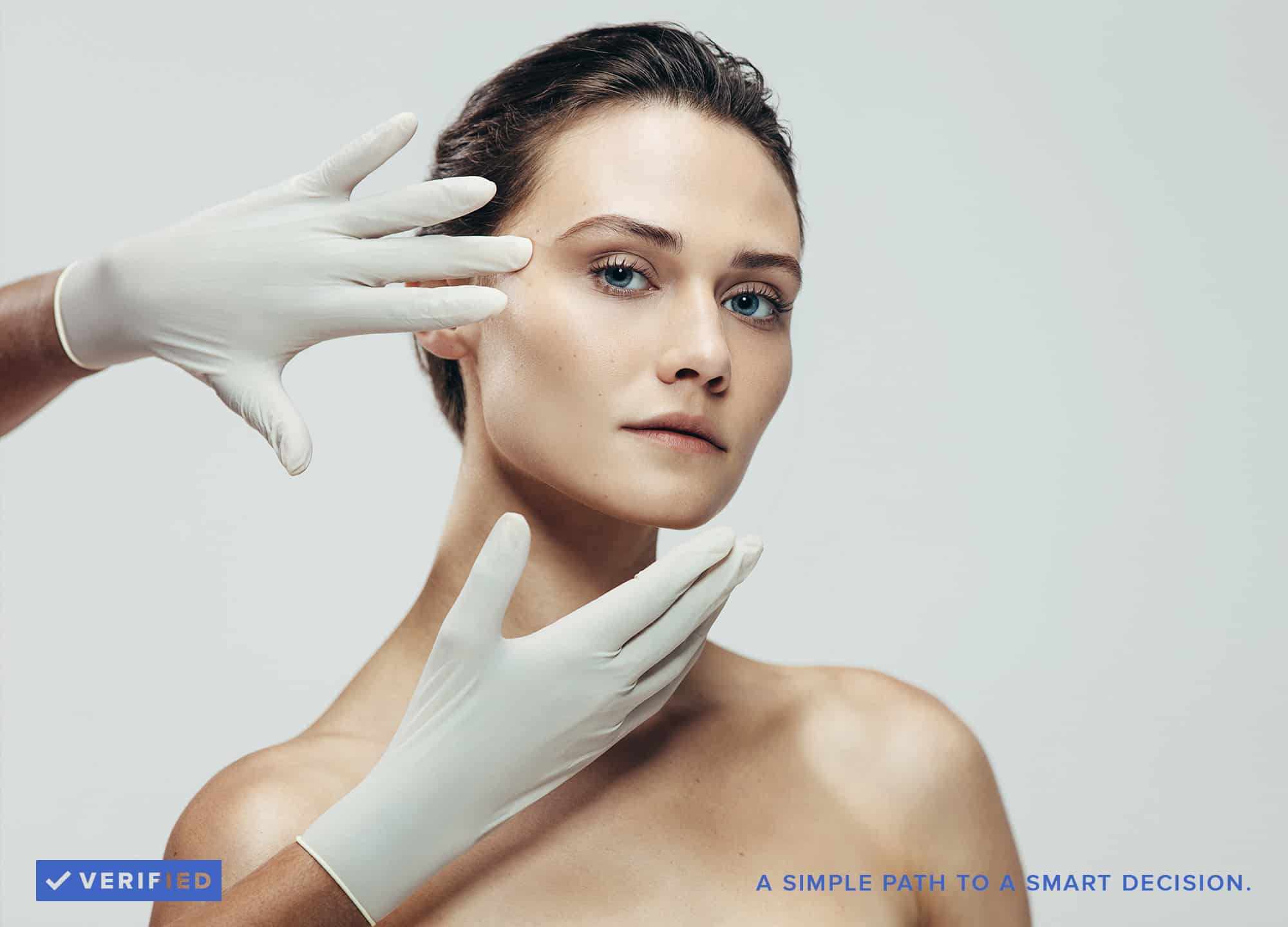This story is part of our RealSelf Verified campaign to offer consumers greater transparency into provider qualifications and help them find trusted, patient-friendly professionals.
Never assume anything. It’s arguably the most important rule of investigative journalism, criminal trials and HBO finale viewings—and it also applies to cosmetic surgery consultations. In fact, you should probably approach all your aesthetic decisions the same way a reporter would: by asking a lot of questions, even if you think you might already know the answer. What you hear may surprise you. The old “When you assume, you make an ass out of u and me” adage holds in both journalism and surgery—and well, the last place you want to risk looking like an ass is on your face.
Below, four RealSelf Verified doctors correct the most common assumptions patients make.
1) Assumption: If they’re performing plastic surgery, they’re a plastic surgeon.
Reality: In just about every other situation in which you’re trusting someone with your life, you can count on the fact that there are rules and regulations in place to ensure that someone is qualified to be doing whatever it is they’re doing. The guy flying the plane is a pilot, the lifeguard knows CPR, the lawyer has a law degree… basic stuff, right? Not in the aesthetics field. “Consumers often don’t realize that a physician from any area in medicine, including those with no surgical residency training, can decide to practice cosmetic surgery,” says Dr. Elizabeth Whitaker, a facial plastic surgeon in Atlanta. That’s why, depending on the procedures you’re considering, it’s important to know with certainty that your physician is board-certified in plastic surgery, facial plastic surgery or oculoplastic surgery, she explains. “Look at their CV or résumé online—[it] should outline their residency and/or fellowship training.”
[Editor’s Note: RealSelf Verified helps consumers cut through this confusion by clearly stating what a physician is board-certified in and their training.]
2) Assumption: They’re controlled by Big Pharma.
Reality: Doctors have no choice but to rely on pharmaceutical companies—but their association doesn’t make them guilty of the industry’s worst practices. The vast majority of physicians got into medicine to advocate for and help patients, not take kickbacks, which Dr. Whitaker assures aren’t even available for the taking. “Big Pharma is regulated in what it’s allowed to give doctors,” she says. “Your physician may go to an educational dinner about a product or service or may do speaking engagements or training for a product they use and be reimbursed for their time.”
However, according to Delray, Florida, dermatologist Dr. Janet Allenby, you should be leery if a doctor uses only a single company’s product line. “Personally, I use everything out there, because each is a tool that makes for a more complete outcome. If one thing could fix it all, we would all just do the one thing—but that’s not the case. If somebody says, ‘I only use Restylane or I only use Juvéderm or whatever brand it is that they’re married to, I think that’s a huge disadvantage to the patient.’”
3) Assumption: They’ll always present you with every treatment option.
Reality: Keep in mind, however, that most doctors don’t have every possible tool in their kit and most cosmetic issues don’t have just one solution. Dr. Guy Massry, an oculoplastic surgeon in Beverly Hills, California, recommends going for multiple consultations. “This is appropriate data collection and is done to assure consistency in medical advice/suggestions.” But don’t be surprised if doctors make slightly different recommendations, says Dr. Whitaker. “That doesn’t mean one doctor is necessarily wrong, as everyone’s experience is different, but that there may be additional options for you to consider.” For instance, two different doctors may recommend two different devices, but if both use similar technology and are designed to treat the same areas, then it’s just a matter of which doctor you feel more comfortable with.
4) Assumption: They have lots of press, so they must be one of the top doctors.
Reality: It’s more likely that they have a great PR agency. “The doctors with higher marketing budgets get more attention, but it definitely does not mean they are the best for any given procedure or task,” says Dr. Gary Linkov, a facial plastic surgeon in New York City. “If you’re really busy, you don’t have time to be doing all this other stuff,” adds Dr. Allenby. “Word of mouth is by far the best exposure. You’re having good outcomes, and people are getting referred in.”
5) Assumption: They’ll say yes to whatever you ask for.
Reality: We’ve all seen the kind of outrageous plastic surgery results that make us second-guess our decisions. That isn’t necessarily the result of a surgeon’s lack of training or experience but, rather, their unwillingness to turn down patients with big ideas and money to blow. Rib removal for a Barbie waist? Breasts so inflated you’ll need back surgery down the line? These are requests good doctors refuse to fulfill—for the sake of their reputation and your health. “I recently had a patient insist on full-face ablative, non-fractionated CO2 laser resurfacing, and I simply said no due to the risk of scarring and very long recovery time,” says Dr. Linkov. “We ultimately want what is best for the patient and will guide people toward the safest, most effective strategy, even if it goes against their initial request.” Dr. Massry adds that patients should never be angry over hearing no but “should take it as a measure of sincere integrity and responsibility.”
Related: 8 Things Reputable Doctors Never Do
6) Assumption: Using all the latest gadgets means you’ll get better results.
Reality: “We’re all a little bit guilty of wanting the newest thing, whether it’s me in my office or a patient thinking that because something is new, it’s better,” says Dr. Allenby, who notes that she personally tests every new device she gets before offering it to a patient. “But I have an IPL I’ve been using for the last 16 years, and it’s still the best as far as IPLs go. I upgrade the handpieces to make sure the equipment is up to date, but the technology hasn’t changed much between this and the newer models.” That’s not to say you should be wary of doctors with all the buzziest toys, just that the tried-and-true fix isn’t always the treatment du jour.
7) Assumption: Training in a procedure = specialty in a procedure.
Reality: Just because a doctor is capable of performing a certain surgery doesn’t mean they’re your best choice. After confirming your doctor is board-certified and has residency training in the procedure you’re looking to get, ask them how many they perform each year and if it’s a focus area for them. “Patients should search based on procedure and not necessarily based on a doctor’s exact training background,” says Dr. Linkov. “For example, an oral surgeon with cosmetic experience may be better at cheek implants than a general plastic surgeon who rarely works on the face, even if that plastic surgeon went to Harvard.” TL;DR: Maybe don’t get your nose job from the doc who did your Brazilian butt lift.
8) Assumption: They’re performing your surgery from start to finish.
Reality: “For any surgery, help is required—we cannot do it all alone,” says Dr. Linkov. This could be as simple as having a nurse pass a surgeon tools or a resident close the sutures to letting another surgeon in the same practice take over the second half, which is why Dr. Linkov advises people to ask in advance who else will be in the operating room and what portion of the procedure will actually be done by the doctor, “since it will vary.”











